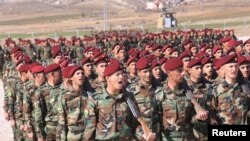Fighting in Iraq's Sinjar region between two rival Kurdish groups in recent days highlights the risk of turf wars among multiple forces fighting the Islamic State group and could hinder allied progress against IS, analysts say.
Fierce skirmishes broke out late Thursday when forces known as Rojava peshmerga moved away from Iraq's border with Syria and headed toward the Sinjar mountain. A local Yazidi militia affiliated with the Turkish-based Kurdistan Workers' Party, or PKK, retaliated and several gun battles raged.
At least two fighters were killed and a dozen others were wounded on both sides, according to military officials and local reports.
“They attacked our bases with heavy weapons and we had no choice but to defend ourselves," Zardasht Shingali, a commander with the PKK-affiliated local Yazidi militia known as Sinjar Resistance Units, told VOA. The Rojava peshmerga was provocative, he said.
Peshmerga take a stand
The peshmerga said in a statement that their forces were blocked and fired at by the Kurdish militia during a repositioning process.
“We want to affirm our stance that peshmerga of Kurdistan have no intention for war and we do not want any clashes to occur in that area,” the statement said.
The peshmerga consider Sinjar a part of Iraq's autonomous Kurdish region and see themselves as the sole security force of the area
“Peshmerga forces are free to move whenever and wherever they want in Kurdistan's soil. We will not ask permission from anyone,” the statement said.
Trapped on Sinjar mountain
Sinjar became a pivotal point in the fight against IS after thousands of minority Yazidis living in the area were either massacred, tortured or forced to leave the area by IS. After IS took over in Sinjar in early August 2014, it murdered roughly 5,000 male residents and enslaved thousands of women and children.
Those who managed to escape became trapped on Sinjar mountain, leading to an international response, including U.S. airstrikes. The United States enlisted local Kurdish factions to keep IS from returning.
The Turkish-based PKK — seen by Turkish authorities as a terrorist entity inside Turkey — sent hundreds of its fighters as a support force for its Iraqi Kurdish brethren in Sinjar.
Local fighters trained
When IS fled Sinjar in late 2015, the PKK refused to withdraw and started training local militias.
The town has since become a major center of dispute between the PKK and forces loyal to the Kurdistan regional government.
“These PKK-affiliated fighters are destabilizing the Sinjar region. They do not belong here," said Mahma Khalil, the mayor of Sinjar.
Rojava peshmerga forces consist of Syrian Kurdish fighters trained by the Iraqi Kurdish government. The forces were initially to be deployed to Syria; but, because of tensions with the People's Protection Units (YPG), another Kurdish group that fights IS in Syria, their deployment has been delayed.
Aid groups have often complained that skirmishes involving rival Kurdish forces in northern Iraq have slowed the pace of reconstruction in the town which was 80 percent destroyed by IS.
“The fighting has prevented NGOs from providing aid to the needy. There are now over 7,000 returning families who live in the town with no electricity, water, and other services,” Ahmed Burjus, deputy executive director of a global Yazidi organization known as Yazda, told VOA.
Yazidi refugees worried about IS
Yazda has teamed up with United Nations-sponsored aid agencies to deliver aid to people living in refugee camps near Sinjar mountain, Burjus said. Yazidi refugees fear returning home because of conflicts between Kurdish forces and fears that IS may exploit the infighting and return to power.
“IS is still controlling a large swath of our land,” Burjus said. He added that Kurdish forces should unite and concentrate on the fight against IS.
"The two sides would do better to rescue the 3,500 Yazidi women and children who are still under IS slavery," Burjus said.
Infighting deflects from attack on IS
The Kurdish infighting could also impede the ongoing war on IS which has seen a lot of progress recently in other parts of Iraq and Syria.
“The two forces that are fighting each other now in Sinjar have been very effective in protecting the town and keeping IS at bay," said Radwan Badini, a politics professor at Salahaddin University in Irbil, the capital of Kurdistan region.
He told VOA that any escalation of this intra-Kurdish fighting “would slow the process to liberate the remaining territory from IS.”
VOA's Kurdish Service contributed to this report.




